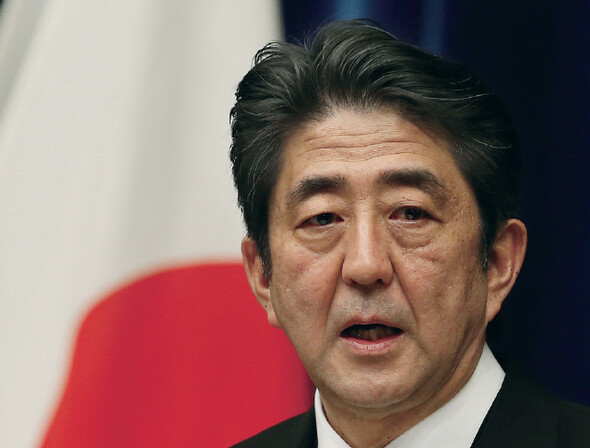hankyoreh
Links to other country sites 다른 나라 사이트 링크
In upcoming statement, Japan’s Abe not likely to mention “deep remorse”

Japanese Prime Minister Shinzo Abe made it even clearer that he does not intend to mention “deep remorse” for Japan’s colonization of Korea in an upcoming government statement, called the “Abe Statement.”
On Jan. 25, Abe appeared on Sunday Debate, a morning talk show on Japanese broadcaster NHK.
During the show, Abe was asked whether the Abe Statement, which the Japanese government is planning to issue to mark the 70th anniversary of Japan’s defeat in World War II, will contain statements about “colonial rule and aggression,” “deep remorse,” and “heartfelt apology,” phrases that appeared in the Murayama Statement in 1995 and a statement by then-Prime Minister Junichiro Koizumi in 2005.
“The point is not whether or not we will use expressions that have been used in the past but rather to make a statement that reflects the perspective of this administration on the 70th anniversary of Japan’s defeat in the war,” Abe said.
When the host of the talk show asked if this meant that Abe would definitely not be using the key phrases included in past statements (remorse for Japan‘s colonial rule and aggression), Abe said that that was correct.
This is the first time that Abe has stated directly that he will not include a phrase about Japan’s remorse for colonization and wars of aggression in the new statement.
In a statement issued on 1995, the 50th anniversary of Japan’s defeat in the war, then Prime Minister Tomiichi Murayama said, “During a certain period in the not too distant past, Japan, following a mistaken national policy [. . .] through its colonial rule and aggression, caused tremendous damage and suffering to the people of many countries, particularly to those of Asian nations. I [. . .] express here once again my feelings of deep remorse and state my heartfelt apology.”
Then Prime Minister Junichiro Koizumi omitted the phrase about “a mistaken national policy” in a statement issued on the 60th anniversary of the war’s end in 2005 but maintained the larger message of the Murayama Statement.
These two statements served as a springboard for Japan to establish friendly relations with its neighbors, including South Korea and China.
“I continue to fully endorse the statements made in the past,” Abe said on Saturday, indicating that he was not contradicting what was said in previous statements.
While attempting to minimize the diplomatic backlash expected if Japan retracts the Murayama Statement, Abe seems to be indicating that he will instead release a statement that undermines the previous statement’s message.
By Gil Yun-hyung, Tokyo correspondent
Please direct questions or comments to [english@hani.co.kr]

Editorial・opinion
![[Column] Season 2 of special prosecutor probe may be coming to Korea soon [Column] Season 2 of special prosecutor probe may be coming to Korea soon](https://flexible.img.hani.co.kr/flexible/normal/500/300/imgdb/original/2024/0426/3317141030699447.jpg) [Column] Season 2 of special prosecutor probe may be coming to Korea soon
[Column] Season 2 of special prosecutor probe may be coming to Korea soon![[Column] Park Geun-hye déjà vu in Yoon Suk-yeol [Column] Park Geun-hye déjà vu in Yoon Suk-yeol](https://flexible.img.hani.co.kr/flexible/normal/500/300/imgdb/original/2024/0424/651713945113788.jpg) [Column] Park Geun-hye déjà vu in Yoon Suk-yeol
[Column] Park Geun-hye déjà vu in Yoon Suk-yeol- [Editorial] New weight of N. Korea’s nuclear threats makes dialogue all the more urgent
- [Guest essay] The real reason Korea’s new right wants to dub Rhee a founding father
- [Column] ‘Choson’: Is it time we start referring to N. Korea in its own terms?
- [Editorial] Japan’s rewriting of history with Korea has gone too far
- [Column] The president’s questionable capacity for dialogue
- [Column] Are chaebol firms just pizza pies for families to divvy up as they please?
- [Column] Has Korea, too, crossed the Rubicon on China?
- [Correspondent’s column] In Japan’s alliance with US, echoes of its past alliances with UK
Most viewed articles
- 1‘We must say no’: Seoul defense chief on Korean, USFK involvement in hypothetical Taiwan crisis
- 2[Column] Season 2 of special prosecutor probe may be coming to Korea soon
- 3N. Korean delegation’s trip to Iran shows how Pyongyang is leveraging ties with Moscow
- 4Korea sees more deaths than births for 52nd consecutive month in February
- 5Amnesty notes ‘erosion’ of freedom of expression in Korea in annual human rights report
- 6[Reportage] On US campuses, student risk arrest as they call for divestment from Israel
- 7[Editorial] New weight of N. Korea’s nuclear threats makes dialogue all the more urgent
- 8‘Weddingflation’ breaks the bank for Korean couples-to-be
- 9[Column] Has Korea, too, crossed the Rubicon on China?
- 10[Column] Park Geun-hye déjà vu in Yoon Suk-yeol